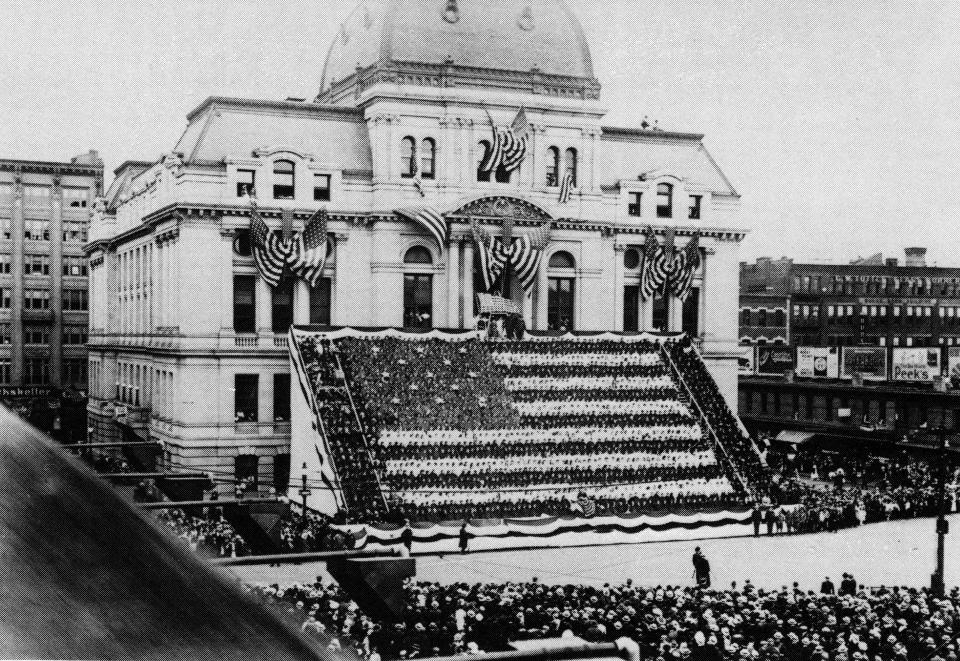Today's world turmoil a reminder of chaos leading to WWI | Opinion
- Oops!Something went wrong.Please try again later.
- Oops!Something went wrong.Please try again later.
Patrick T. Conley is historian laureate of Rhode Island.
Armistice Day, now known as Veterans Day, is commemorated every year on November 11, the date in 1918 when the Allied Powers led by England, France, and the United States signed an agreement with Germany, Austria-Hungary, and the Central Powers to end World War I hostilities.
This world war arose in a European hotspot called the Balkans on June 28, 1914 when a Bosnian Serb nationalist and terrorist assassinated Austrian Archduke Franz Ferdinand and his wife Duchess Sophie prompting the Austro-Hungarian Empire to declare war on Slavic Serbia. That act set off a wave of war declarations that plunged Europe into chaos. (The turbulent Balkans of that era bear a strong resemblance to the modern, volatile Near East.)
That global conflict, entered by the U.S. on April 7, 1917 via a declaration of war against Germany, resulted in 48,909 American battle deaths and an additional 56,991 fatalities from the war-born Spanish Flu. Rhode Island contributed 28,817 troops of whom 612 died. Many of those fatalities resulted not from German bullets but from influenza.
More: RI National guard plays a key role in Kosovo
When I was a professor at Providence College, teaching a course in modern American diplomatic history, I observed that there are three basic sources of American foreign policy:
First is the strategic root, epitomized by the imperialistic actions of President Theodore Roosevelt to protect America’s defensive perimeter. That motive was influenced by the writings of Captain Alfred Thayer Mahan of Newport’s Naval War College.
Second is the economic root practiced by Roosevelt’s successor; President William Howard Taft, via his aptly-named “Dollar Diplomacy.” It is designed to improve the nation’s wealth and standard of living through favorable foreign trade agreements.
The third is the idealistic or missionary root exemplified by Taft’s successor, President Woodrow Wilson, who aimed to “make the world safe for democracy.”

All three approaches strengthened during the first two decades of the 20th century when the United States used its industrial might to emerge as a world power. All have merit − unless one is pursued unilaterally to the detriment of the other two.
World War I, whose end we thankfully celebrated on Armistice Day, was a classic example of the missionary approach.
Our zeal to become “the arsenal of democracy” plunged us into a European dynastic conflict that some recent historians (including myself) have labeled “America’s Greatest Blunder.”
During our current campaign to make the world safe for democracy − a noble ideal − America is ignoring its security by allowing an open border and depleting its military and energy reserves; and its costly international giveaways are hurting our economy and lowering our standard of living.
Prior to our entry into World War I we allowed a steady stream of anti-German propaganda, much of it fabricated, to sway public opinion, but, as we discovered later, the Germany of Kaiser Wilhelm II was a far cry from the Germany of Adolph Hitler. We boldly violated our own neutrality laws by sending massive shipments of arms and munitions to England and her Allies with the approval of our Anglophile President, Woodrow Wilson, and his very influential advisers.
More: His niece murdered, her son shielded beneath her body: A family's final moments in Israel
Historians and foreign policy experts have written dozens of volumes on America’s entry into World War I – far too many to be summarized in this brief essay. However, one such historian, Harry Elmer Barnes, has coined a phrase that resonates with me: America, said Barnes, is in danger of “waging perpetual war for perpetual peace.”
On Nov. 11, we now justly honor our veterans for contributing a significant portion of their lives towards defending American security, our standard of living, and our democratic values.
Let us not blindly choose to transfer that honor to Memorial Day by engaging in a disastrous global war with a mammoth death toll while deluded by propaganda, emotion, and a unilateral missionary motive. The lesson of World War I should not be forgotten.
Alas, as a historian I have learned an important thing from my study of history, namely that many leaders do not learn from history and, therefore, they are condemned to repeat its disastrouserrors.
This article originally appeared on The Providence Journal: During our current campaign to make the world safe for democracy − a noble ideal − America is ignoring its security.

